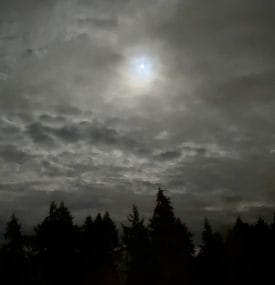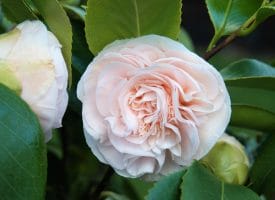Learning from Women Writers, Under a Wolf Moon, Looking at Book Publishers During Submission Season, and Waiting (and Waiting) for the Vaccine
- At January 31, 2021
- By Jeannine Gailey
- In Blog
 3
3
Under a Cold Wolf Moon
Many people have been talking to me lately about feeling stressed, having insomnia, feeling anxious about getting the vaccine (welcome to the club on that one!) and general angst. Just consider that we are about to hit the one-year mark on the pandemic taking over our lives. That is a long time to live in fear, uncertainty, maybe losing jobs and family members, your hobbies and friends, your sense of normalcy. 2020 – and 2021, probably – have been traumatic years. It is normal to feel a little lost, a little frazzled, a little at the end of your rope. Also, this full moon of the past few days has always been a weird one for me – the day I was hospitalized and diagnosed with MS with a full Wolf Moon night, for instance. The moon messes with people’s mood and sleep – a known thing. And it is hard to sustain hope during a worldwide pandemic. The plague years – 1918’s killer flu, the bubonic plague, the years tuberculosis swept Seattle – are bitter, hard years for everyone, almost like war years. We’ve lost 425,000 people in less than a year, and many more have long term damage, and we’re still not 100 percent sure how to treat it now, though we’re doing better than we were last February. And four vaccines within a year (only two have been approved in the US, but hopefully AstraZenaca and Johnson and Johnson will be approved soon) is pretty incredible, even if our rollout has been chaotic and too sporadic as of yet. Anyway, just like the photo – there’s light at the end of the tunnel, even if the light is obscured by clouds of uncertainty.
Learning from Women Writers
My goal to keep learning about women writers and their lives continues, this week with the second season of Dickinson, the Apple series on Emily Dickinson, reading Red Comet, the latest biography of Sylvia Plath, and also research on Stella Gibbons, a curiously undercelebrated early-twentieth century English novelist and poet, who wrote Cold Comfort Farm, the satiric novel she’s best known for, but also 22 other books, including a couple of books of poetry and many short stories and the book I’m reading now, My American. Stella was, like me, a journalist before she was a poet and fiction writer. Many of her books are out of print and unavailable in America, but she won a bunch of awards in her day, and held literary salons into the 1970s. When I read about the lives of successful women writers, I’m always curious about their similarities – for instance, women writers like Atwood, Gluck, and Plath (and me) were all the daughters of scientists – Gibbons’ father was a doctor (“a good doctor,” his daughter would say, “but a terrible father” – he was often violent at home but charitable at work). Otto Plath was one of the leading experts on bumblebees in his time – he began his PhD at Harvard at age 40 before he met Plath’s mother, so he was a very old father – but not, by all accounts, much fun to be around. (Coincidentally, Plath’s son, Nicholas, kind of followed in his grandfather’s footsteps – became a leading expert in the Northwest on salmon and orca patterns, before taking his own life in his early forties.) Sylvia had a kind of extreme ambition and broke 50s modes by being a woman who wanted to work and have children at the same time (gasp), while Stella Gibbons poked fun at the literary community and often refused to follow convention of what women writers were supposed to be like. Being different – standing out – and rebelling against current modes.
Dickinson, the show, besides having a really fun contemporary music thing going on in the background, revels in pointing out Emily’s early ambitions and successes, before her near complete retreat into solitude later in life. In season 2, through her best friend/sometimes girlfriend/sister-in-law Susan, she meets the editor of her local newspaper, who may – or may not – publish her poetry. She complains that she feels unable to write, like “a daisy that needs the sun” of the editor’s approval to shine on her. Another character turns to her and says, “You are not the daisy. You are the sun. Be the sun.” I thought this was very profound, flipping on its head the way that writers often feel – desperately waiting for some publisher or editor to notice us – and instead insisting that the artist is the important source of what the editor or publishers do, the creative force on which they feed. Empowering writers who suffer from the cycle of constant rejection and even worse, inattention of the literary world, seems important for our mental health, and productivity. Remember, you are not the daisy, you are the sun.
Looking at Book Publishers During Submission Season
This brings me to something I don’t think enough writers talk about during submission season – as many first book contests open up and open submissions periods open – which is, deciding which book publishers to send your book manuscript to. They are not all going to be perfect fits. This year’s judge may be looking for certain things which you can never be. They may not be interested in your subject matter, or your point of view, or the publisher just doesn’t publish the kind of thing you write – they’re extremely conservative and publish formal verse, and you’re experimental, or they’re interested in ecological issues, and you’re interested in exploring mythology. So how do we decide?
You would think I would know more about this as I am sending out my sixth and seventh books-in-progress. There are actually fewer opportunities for people like me than you would think – there are many more opportunities for people publishing a first or second book. This time around, a little older and perhaps wiser, I’m looking for a publisher that has good distribution and more than one person running the press, maybe some press with an actual person just dedicated to publicity and marketing. I’d like a press that I could stay with for more than one book, who might be interested in helping support my career down the road, who might consider, for instance, eventually doing a Selected Work or Collected Work. Are these crazy dreams? Maybe…
The process of sending out manuscripts is so expensive that I have to be pretty selective, especially if I want to send out multiple manuscripts. Sometimes it takes a long time to hear back from presses or contests, which is frustrating. The plague year hasn’t made things easier for those in the poetry publishing business, I’m sure, or for us as writers. It’s like targeted gambling, in a way, in that you choose which presses seem most likely to welcome your style, your content, your kind of work. So, that’s the work I have to do this month and next month…
Waiting for the Vaccine
Speaking of frustration, wait times, and gambling, waiting for the vaccine as a chronically-ill, immune-suppressed person who has not been allowed to get the vaccine yet by her state is pretty terrifying and frustrating. Why people with chronic illnesses (or teachers, for that matter) haven’t been prioritized is confusing to me. I see states who are doing a much better job than Washington State is in getting their shots into people’s arms. There’s not much I can do about this except stay Zen, stay aware of any changes in policy and places I might be able to get access a vaccine, and advocate for my vulnerable group with politicians like Jay Inslee. My father has had the shot, in Ohio, and my older brother and sister in law who are health care workers in Tennessee have gotten the shot, but that is it in my family. You would expect Seattle with all its money and hospitals to be doing a much better job. Sigh. Well, I’ll let you know when anything changes. I hope you also get your vaccine sooner rather than later.






 Jeannine Hall Gailey served as the second Poet Laureate of Redmond, Washington and the author of Becoming the Villainess, She Returns to the Floating World, Unexplained Fevers, The Robot Scientist’s Daughter, and winner of the Moon City Press Book Prize and SFPA’s Elgin Award, Field Guide to the End of the World. Her latest, Flare, Corona from BOA Editions, was a finalist for the Washington State Book Award. She’s also the author of PR for Poets, a Guidebook to Publicity and Marketing. Her work has been featured on NPR’s The Writer’s Almanac, Verse Daily and The Year’s Best Fantasy and Horror. Her poems have appeared in The American Poetry Review, Poetry, and JAMA.
Jeannine Hall Gailey served as the second Poet Laureate of Redmond, Washington and the author of Becoming the Villainess, She Returns to the Floating World, Unexplained Fevers, The Robot Scientist’s Daughter, and winner of the Moon City Press Book Prize and SFPA’s Elgin Award, Field Guide to the End of the World. Her latest, Flare, Corona from BOA Editions, was a finalist for the Washington State Book Award. She’s also the author of PR for Poets, a Guidebook to Publicity and Marketing. Her work has been featured on NPR’s The Writer’s Almanac, Verse Daily and The Year’s Best Fantasy and Horror. Her poems have appeared in The American Poetry Review, Poetry, and JAMA.







Renee Emerson
I’ve started sending out my 3rd manuscript, and you are right, there are a lot fewer opportunities! It is also sort of niche (persona poems from the perspective of women missionaries) so either a judge likes that or absolutely loathes it… I’ve not sent it out much because I plain don’t know where to send it!
Jeannine Gailey
They’re small, and usually focus on women’s Jewish or speculative poetry, but Mayapple may want this.
Renee
Thank you I will check it out!